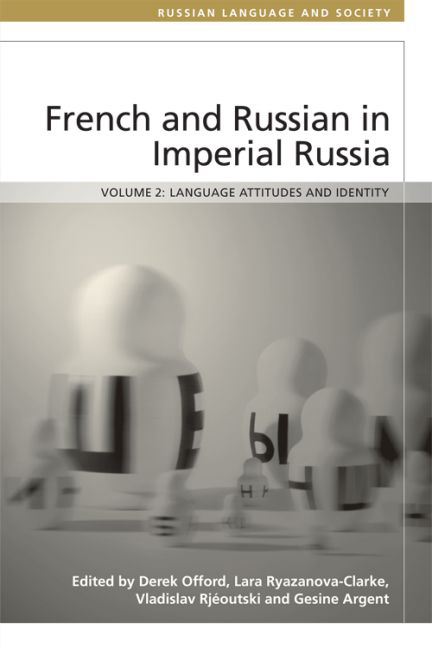Book contents
- Frontmatter
- Contents
- Preface
- Note on Dates, Transliteration and Other Editorial Practices
- Abbreviations Used in the Text, Notes and References
- Dates of Reigns in Eighteenth- and Nineteenth-Century Russia
- Dedication
- Introduction
- 1 The Pan-European Justification of a Multilingual Russian Society in the Late Eighteenth Century
- 2 Princess Dashkova and the Politics of Language in Eighteenth-Century Russia
- 3 Plating ‘Russian Gold’ with ‘French Copper’: Aleksandr Sumarokov and Eighteenth-Century Franco-Russian Translation
- 4 Francophone Culture in Russia Seen through the Russian and French Periodical Press
- 5 Linguistic Gallophobia in Russian Comedy
- 6 The Linguistic Debate between Karamzin and Shishkov: Evaluating Russian–French Language Contact
- 7 Language and Conservative Politics in Alexandrine Russia
- 8 Seduction, Subterfuge, Subversion: Ivan Krylov's Rewriting of Molière
- 9 The French Language of Fashion in Early Nineteenth-Century Russia
- 10 Russian ‘Translations’ of Patrie in the Napoleonic Period
- 11 Treatment of Francophonie in Pushkin's Prose Fiction
- 12 Love à la mode: Russian Words and French Sources
- Conclusion
- Notes on contributors
- Index
4 - Francophone Culture in Russia Seen through the Russian and French Periodical Press
Published online by Cambridge University Press: 25 October 2017
- Frontmatter
- Contents
- Preface
- Note on Dates, Transliteration and Other Editorial Practices
- Abbreviations Used in the Text, Notes and References
- Dates of Reigns in Eighteenth- and Nineteenth-Century Russia
- Dedication
- Introduction
- 1 The Pan-European Justification of a Multilingual Russian Society in the Late Eighteenth Century
- 2 Princess Dashkova and the Politics of Language in Eighteenth-Century Russia
- 3 Plating ‘Russian Gold’ with ‘French Copper’: Aleksandr Sumarokov and Eighteenth-Century Franco-Russian Translation
- 4 Francophone Culture in Russia Seen through the Russian and French Periodical Press
- 5 Linguistic Gallophobia in Russian Comedy
- 6 The Linguistic Debate between Karamzin and Shishkov: Evaluating Russian–French Language Contact
- 7 Language and Conservative Politics in Alexandrine Russia
- 8 Seduction, Subterfuge, Subversion: Ivan Krylov's Rewriting of Molière
- 9 The French Language of Fashion in Early Nineteenth-Century Russia
- 10 Russian ‘Translations’ of Patrie in the Napoleonic Period
- 11 Treatment of Francophonie in Pushkin's Prose Fiction
- 12 Love à la mode: Russian Words and French Sources
- Conclusion
- Notes on contributors
- Index
Summary
The French language was widely known and used in high society in eighteenth-century Russia; indeed it was commonly considered superior to Russian. However, during the second half of the century, debate began about the respective merits of the two languages and the supposed effects of Russian francophonie. While some Russian literati thought that Russian national culture could be improved if Russians used the French language and imitated French belles lettres, other writers, including dramatists such as Aleksandr Sumarokov and Vladimir Lukin and certain individuals who anonymously represented court opinion in periodical publications, found various ways of expressing concern at the prospect of foreign cultural domination. Attempts to resist such domination included the creation of fictitious Francophile characters whose extravagant behaviour was ridiculed in imaginative literature, on the stage and in articles that appeared in the periodical press, which became one of the major fora for linguistic debate.
The aim of this chapter is to provide an overview of journalistic contributions to discussion of Russian francophonie. (I am not concerned here with the occurrence of French in Russian periodicals – a subject which would itself constitute a worthwhile field for investigation – or with the Russian francophone press.) In the process of considering this discussion, I hope to show that the periodical press was an important medium for the development of linguistic attitudes. I shall begin by briefly examining the journalistic context in which debate about language use in Russia developed, focusing on the appearance of a new type of periodical in eighteenth-century Europe, and in Russia in particular. Next, I shall analyse the discussion itself, concentrating on discourses which defend the Russian language and on comments on the French language and its use, which range from statements about its value to expressions of outright Gallophobia. However, I shall not restrict myself to what was written in Russia (although I shall focus mainly on that), for debate about Russian francophonie crossed international borders, finding its way even into the French press, to which I shall also devote a brief section. By examining both Russian and French material, we might gauge the impact of the discussion of Russian francophonie at international level and see how international networks were used to disseminate and broaden views about this phenomenon.
- Type
- Chapter
- Information
- French and Russian in Imperial RussiaLanguage Attitudes and Identity, pp. 64 - 78Publisher: Edinburgh University PressPrint publication year: 2015

